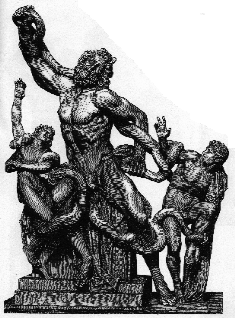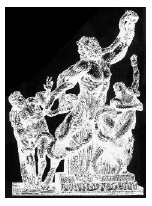A Journey to Sciatica
By Dr. Phage

The humans also fight The Eaters (rotifers) and communicate with paramecia (who are profoundly logical creatures, but lack all imagination). It is one of the classics. Why does this keep crossing my mind? Is there something about my current existence that is like living in a teaspoon of water?
There is a somewhat similar story by Hal Clements, the details of which I cannot call up. Strange the amount of classic science fiction that I can recall in detail. This residue of my misspent youth has only lately been coming into my conscious mind --- but there must be a lot of Sci-Fi debris down there in the Memory Register.
By universal agreement, the best of all these classic stories --- it came in first in a poll of the Science Fiction Writers of America --- was Isaac Asimov's "Nightfall". You may remember it. A world with many suns, in which there is constant light except for one night every two thousand years, during which everyone goes mad and civilization collapses. It is a magnificent story, and illustrates one of my favorite aesthetic theories.
Years after writing this classic story, Asimov had the absolutely idiotic idea of expanding it into a full-length novel. I read the novel a couple of years ago, and it is a real stinker. Compare the story, which is perfection, to the novel to really see what wretched excess means.
A strange case: Asimov was a talented writer, but he was a compulsive, couldn't stop writing. He churned out dozens of books every year, good, bad, indifferent, it didn't matter. He didn't need to ruin his best story, but he couldn't help himself. His parents came from the Russian Empire, which was synonymous with wretched excess. Aha: Isaac must have drunk in from early childhood an inability to stop when you are ahead, to say just enough and no more.
Frankly, I still don't know what the computer means when it asks me to "allow this cookie?" I'm a soft touch for cookies, and even, at first, entertained a vague hope that the computer would send a brownie to me through Drive C: --- so I always allow it. I am always disappointed.
Although I am willing to use Netscape from the university where I teach, at home I always travel the Internet by means of LYNX. This is a vintage, pre-windows vehicle which you start with a hand-crank, and drive, with keyboard rather than mouse, while wearing goggles, a linen cap, and a silk cravat. It's top speed is only 20 mph with the top down, but it can access any website and any of the mighty search-engines (Lycos, Yahoo, Webcrawler, et. al.)
Best of all, LYNX does not suport graphics and consequently is wholly free of advertising. It is amazing that the use of a this antique browser is still legal, but perhaps the computer police are watchfully compiling files on those of us who still travel by LYNX, and one of these days the cookie will drop for all of us.
I've had a lot of time at home this month. My annual laryngeal/bronchial attack had hardly subsided, when I was hit last weekend by my old friend sciatica. The latter, a crippling episode this time, has something to do with a floppy disc in the lumbar region, and the sciatic nerve. The latter, you will recall, goes from the Lumbar region South, passing through Tuscany on its way to Emiglia Romana, Umbria, Calabria and the Sciatic Coast.
We TAs (the abbreviation means Temporarily Abled, remember?) think we have a secret understanding with life to spare us the worst, so this sort of thing is a novel experience for us. Live and learn. (On the other hand, consider this bumper sticker: The more you complain, the more god let's you live.)
So, I continued to stay home on sick leave, scuttling about the house on my cane with a crab-like, sidewise motion --- our friend Marguerite calls this The Thousand Year Old Man Syndrome --- and searching for those elusive positions (they really exist! But never for long!) of relative comfort. The only treatment is kilogram quantitites of iboprufen, rest (they call this rest?), and vigorous complaint.
The University I work at, it turns out, has a generous sick-leave policy: 90 days paid sick-leave per year. Hell, that means one whole quarter per year. If only I had known about this and put it to use during the past 35 years. I could have started off in the 60s by taking much longer peyotl trips, during the week, and just calling in sick:
"Hello, Genetics Department? This is Dr. Phage (I think) calling from the planet Ixneria. I've come down with a touch of phantasmatosis, and I'll have to stay out on sick-leave until I stop changing shape."
Ah, the things we've missed out on.
Reading a marvelous book, Solomon Gursky Was Here by Mordecai Richler. There are certain books which are a glorious half sardonic/half affectionate send-up of a whole culture. Cervantes on Spanish knightly culture in Don Quixote, Flann O'Brien on Irishry in At Swim Two Birds. Richler manages this simultaneously for both Jewish and Canadian culture in this book, with hilarious asides on the Brits, the Americans, the drinking life, and god knows what else. It is a hoot, leaves no group unoffended. Mordecai is one of us.
In one section, the millionaire heir Henry Gursky settles in the Canadian Arctic and goes native, in a sense, by living with the tribe of Jewish Inuits his great-grandfather had converted. Their favorite delicacy is onions fried in seal schmalz, and at their Passover seder, they combine imported matzoh with polar-bear liver. [I swear that I just read this book, more than a year after I wrote a similar piece on Passover at Chelm. Mordecai Richler and I just happen to share some genes, it seems.]
Henry marries a nice Jewish Inuit girl from the tribe, and the apple of his eye is his half-Eskimo son Isaac. Isaac is, as you can imagine, a walking identity crisis, especially after his fond Dad sends him down to Brooklyn, to go to school at the Lubavitcher academy. Then, on a visit home (during Passover holiday), Isaac and several companions suffer a terrible accident on a trek across the arctic wastes, and Isaac is reduced to roasting bits and pieces of his companions in order to survive. The problem of kosher versus treyf becomes especially pressing, you can imagine, when you have to decide who as well as what to eat. This makes Isaac's identity problems even worse. In the end, he returns to New York, the Lubavitchers expel him for cannibalism, and he taps his inheritance of Gursky millions in order to become a film-maker.
For some reason, the parts of the book about Henry and Isaac ((My son the Eskimo!)) spoke to me at more than one level. Could this have to do with my own semi-aboriginal children? Or my secret dreams of cannibalism? Richler is a cunning writer.
You wrote that when we find a bad habit that is dangerous, we can always find a pill to cure it. For example, you said that you drink tea in the morning, which puts your blood pressure into the stratosphere, but you immediately take a pill to lower your blood-pressure. An old idea, really, although some of the old versions were of doubtful efficacy: in the 18th century, they hawked anti-earthquake pills in Portugal.
I see the logical extension of this: the pharmaceutical revolution will soon keep pace with environmental degradation. or at least try to. An anti-smog pill! An anti-UV irradiation pill to make up for the diminishing ozone layer! An anti-beta-and-gamma-radiation pill to compensate for all those leaks at the Hanford nuclear reservation. Whether these things quite work or not --- remember the anti-earthquake pills --- they will sure be worth much more than their weight in gold. Pfizer's hottest new pill (viagra) is worth 14 times the equivalent weight of gold, wholesale. All of this persuaded me, recently, to shift some of my investments into a pharmaceuticals mutual fund. I counsel you to do likewise, if you have control over your portfolio. Get that money out of pork belly futures, and plug it into Pfizer and Lilly!
Still, they don't have a miracle drug for lumbar trouble. Boy, would that sell: Lumboft, two tablets a day. As for me, I have developed my own treatment. I obtained written authorization for sick-leave from my physician, and I taped it to my lower back, under the ice-pack. The result was a definite measure of relief, coincident with my University department's organizing a way to run my course entirely in my absence.
 This is my second week of staying home, nursing my floppy disc and sciatic nerve. I anticipate a very, very slow recovery, requiring me to continue on sick leave for the rest of the quarter, on into June. Then, I have Summer quarter (no teaching); after that, I'm on sabbatical next year, and hope to return from sabbatical just in time to retire, at least
partly. Maybe, by then, I will have achieved a measure of recovery. No pill involved, just Zen. The Zen of not working.
This is my second week of staying home, nursing my floppy disc and sciatic nerve. I anticipate a very, very slow recovery, requiring me to continue on sick leave for the rest of the quarter, on into June. Then, I have Summer quarter (no teaching); after that, I'm on sabbatical next year, and hope to return from sabbatical just in time to retire, at least
partly. Maybe, by then, I will have achieved a measure of recovery. No pill involved, just Zen. The Zen of not working.
Or at least not working for my University. But, in truth, I have become reconciled to that institution lately. It is The No Place. The place to which one does not go, but which sends the check. This is my koan for the academic life in our time.